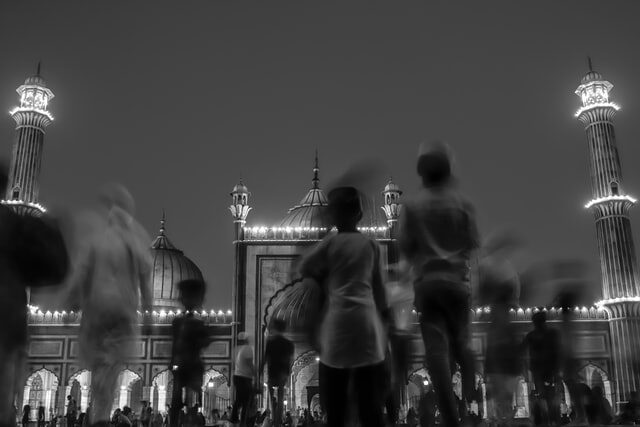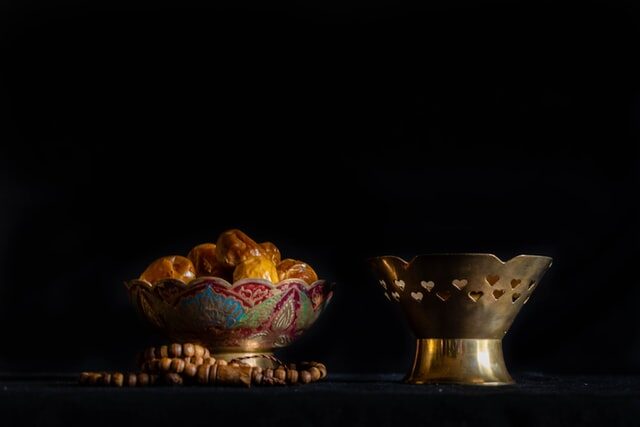Guidance regarding basic Islamic issues – which Hazrat Amirul Momineen, Khalifatul Masih Vaa has given on various occasions in his written correspondence and during MTA programmes – is being officially published below for everyone’s benefit
Hair removal and tattoos

An Arab lady wrote to Hazrat Amirul Momineen, Khalifatul Masih Vaa that a woman had asked her if it was permissible for a Muslim woman to run a business involving the plucking of eyebrows and making tattoos on women’s bodies.
In his letter dated 27 April 2021, Huzooraa provided the following guidance on this issue:
“It is not permissible to tattoo someone or to get a tattoo. Its prohibition has also been mentioned in ahadith, where it states that Allah the Exalted had cursed those women who, for cosmetic or aesthetic purposes, practised tattooing, and those who got themselves tattooed, and those who plucked facial hair, and those who artificially created a space between the front teeth, and those who practised artificial lengthening of the hair, and those who got their hair lengthened artificially, who altered Allah’s creation. (Sahih al-Bukhari, Kitab al-Libas)
“There is always some or the other point of wisdom behind every Islamic commandment. Moreover, some Islamic injunctions have a specific context and background to them. If we disregard their background, then they would become distorted. When the Holy Prophetsa was commissioned as a prophet, on the one hand, the poison of various kinds of polytheism had spread everywhere in the world and especially in the Arabian Peninsula, and on the other hand, different kinds of misguided attitudes had also gripped humanity in their claws. Men and women were involved in various kinds of polytheistic rituals and social evils.
“The ahadith that prohibit the above-mentioned actions, especially mention two motivators [behind those actions]; (a) the altering of God’s creation or (b) looking more beautiful.
“When we carefully consider these two aspects, we observe that the first aspect, namely ‘the altering of God’s creation’, points to social evils and also reflects polytheistic practices. Hence, wearing long braids, wrapping them around like turbans and then considering those to be a sign of nobility or sacrament; wearing braids or topknots as a vow of devotion to some saint or guru; shaving the top of the head while growing hair around it and considering it a blessing for children; having the image of a goddess, idol or animal tattooed on the body, face or arms etc. to seek blessings – these were all polytheistic practices, driven by mythical superstitions.
“The second aspect, that is ‘for the sake of beauty’, in some respects, reflects social misconduct and obscenity. It is not forbidden for a person to adopt any legitimate methods for their own beauty while remaining within the permissible limits. Hence, it is mentioned in a hadith that a person said [to the Holy Prophetsa] that he liked and admired a fine dress and shoes and he asked if it constituted arrogance. The Holy Prophetsa replied that that was not arrogance. Arrogance was to deny the truth and despise others. He went on to say:
إِنَّ اللّٰهَ جَمِيلٌ يُحِبُّ الْجَمَالَ
“‘Allah is most Beautiful and loves beauty.’ (Sahih Muslim, Kitab al-Iman, Bab Tahrimi l-Kibri wa Bayanih)
“Moreover, it is a well-established fact that even in those days when women were to be married, they too would be adorned according to the traditions of that era. (Sahih al-Bukhari, Kitabu l-Hibati wa Fadliha wa t-Tahrisi ‘Alahiha, Babu l-Isti‘arati li l-‘Urusi ‘Inda l-Bina’; Fath al-Bari fi Sharh Sahih al-Bukhari, Kitabu n-Nikah, Babu Isti‘arati th-Thiyabi li l-‘Urusi wa Ghayriha)
“Therefore, the attainment of ‘beauty’ about which the Holy Prophetsa warned of God’s curse certainly means something else. Hence, when we carefully ponder over the ahadith in this regard, we see that the Holy Prophetsa, when prohibiting these things, added that the Children of Israel perished when their women started such acts. At the time of the Holy Prophetsa, lewdness was common among the Jews and at that time, there were several brothels in Medina. The women who were involved in this business would employ such tactics of embellishment to beguile the men. Hence, Allah’s Messengersa expressed his dislike and forbade believing women from using those [means of enhancing beauty].
“Thus, the prohibition of these things appears to stem from the wisdom that if they result in such an artificial change in the physical appearance of an individual that the distinction between man and woman, which God Almighty has created in human beings, vanishes, or there is a fear that this kind of action may lead to inclination towards shirk, which is the gravest of sins; or if these things are carried out in order to beguile the opposite sex in an impermissible manner, then all these actions would be considered unlawful and actionable.
“As far as getting a tattoo is concerned, whether it is a man or a woman, the only purpose behind it is to show it off or to beguile the opposite sex in an impermissible manner. That is why people usually get tattoos on body parts that they may then expose and exhibit to the public. However, if a person gets a tattoo on a body part which is commanded to be veiled [satr], then first of all, while having that tattoo, the individual violates the commandment of purdah and commits obscenity which is against the teachings of Islam. Moreover, one idea behind getting tattoos on the veiled parts of the body is that they may be exposed in front of the opposite sex while committing evil deeds. All of these methods are prohibited because they contradict Islamic teachings.
“Furthermore, tattoos have also been linked to a host of physical and health issues. For instance, the sweat glands under the skin are badly affected in the areas of the body that have tattoos, that is having a tattoo reduces the sweating in the concerned parts of the body, which is harmful to one’s health. Similarly, since tattoos become permanent features on the skin, sometimes as the body grows or shrinks, so does the shape of the tattoo, which makes the tattoo look ugly instead of ‘beautiful’. Then such individuals begin to think of them as a plague that they cannot get rid of. Thus, for these reasons alone, it is futile and absurd to get a tattoo.
“As for the question of women shaping eyebrows for beauty while staying within their Islamic limits, it was within the context of the [above-mentioned] vices that the Holy Prophetsa forbade such things to the believing women. However, he also gave permission in exceptional circumstances on grounds of someone’s suffering or illness. Hence, it is narrated by Hazrat Abdullahra bin Mas‘ud that:
سَمِعْتُ رَسُوْلَ اللّٰهِ صَلَّى اللّٰهُ عَلَيْهِ وَسَلَّمَ نَهَى عَن النَّامِصَةِ وَالْوَاشِرَةِ وَالْوَاصِلَةِ وَالْوَاشِمَةِ إِلَّا مِنْ دَاء
“‘I heard Allah’s Messengersa forbidding the plucking of hair, filing of the teeth, having artificial hair and having tattoos done except on grounds of illness.’
“Islam has made actions dependent on their intentions. Therefore, in this age, there is nothing wrong with a woman making use of these things in a lawful way and for a legitimate purpose as long as she is observing the Islamic injunctions regarding hijab. Nonetheless, if these actions lead to an inclination toward vices or they lead to an expression of any polytheistic rituals or disobedience to a clear command of Islam – for example, if women do not take full care of their purdah and expose their private parts [satr] in front of other women while having their waxing or other treatments etcetera done – then such actions would be counted among those against which we have been warned by the Holy Prophetsa and they would be unlawful.
“Furthermore, it should also be kept in mind in this regard that Allah the Exalted has declared discord and disorder to be greater sins than murder and has commanded their abolition. There have been some instances where marriages were dissolved or divorces were issued after marriages because the husband found out later that the woman had facial hair. If they are not cleaned or plucked out, these few hairs would ruin more houses, and a long series of unpleasantries would begin. In any case, it was not at all the objective of the Holy Prophetsa to give rise to a situation in society that would lead to the spread of disorder in the homes. The wisdom behind his uttering such harsh words appears to be that since polytheism is the gravest of sins and these practices were employed for the sake of various deities etcetera, or since they used to be tools for promoting indecency, he expressed his disgust about them in the strongest possible terms, and thus uprooted polytheistic customs and indecency.”
(Author’s note: Some parts of the above answer have already been published in different episodes of Answers to Everyday Issues in response to various questions. The complete and consolidated answer given by Huzooraa to the above question is being published here for the benefit of the readers.)
Eid on a Friday

In response to a report submitted by the nazim of Dar-ul-Ifta regarding the offering of Jumuah or the Zuhr prayers after the Eid prayer in case of the coinciding of Eid and Friday, Hazrat Amirul Momineen, Khalifatul Masih Vaa, in his letter dated 16 May 2021, provided the following guidance:
“We only find the position and practice of Hazrat Abdullah ibn Zubayrra in support of not performing the Jumuah or the Zuhr prayers following the Eid prayer in case of the coinciding of Eid and Friday. This view is merely based on a maqtu‘ narration. Moreover, we find a contradiction in the statements of two of the narrators of this tradition. According to authentic and reliable ahadith, the sunnah of the Holy Prophetsa, the view of the rightly-guided Caliphs and the position of the Companionsra were that all of them would perform the Friday prayer on time in such a case, in addition to performing the Eid prayer, and would give leave to the people coming from remote places and would direct them to instead offer the Zuhr prayer in their respective areas. Or, on some occasions, they did not offer the Friday prayer after the Eid prayer, but the Zuhr prayer was certainly still offered on time.
“The same view and practice are found during the times of the Promised Messiahas and his Caliphs, except for the one-off practice of Hazrat Khalifatul Masih IIIrh when he did not perform the Jumu‘ah or the Zuhr prayer after leading the Eid prayer in accordance with the above-mentioned narration of Hazrat Abdullah ibn Zubayrra.
“However, this narration of Hazrat Abdullah ibn Zubayrra is not based on any statement or action of the Holy Prophetsa or his rightly-guided Caliphs. Therefore, the obligatory prayers cannot be abandoned just because of this maqtu‘ narration, whose narrators also contradict each other. Thus, please revise [the book] Fiqh-e-Ahmadiyya to exclude the section based on this tradition from it and write there that if Eid and Friday coincide and Jumu‘ah is not offered following the Eid prayer, then the Zuhr prayer must still be offered on time.”
Recitation of the Holy Quran during zawal time

A lady asked Hazrat Amirul Momineen, Khalifatul Masih Vaa why one should not recite the Holy Quran from noon to one o’clock in the afternoon and when the sun is rising.
Huzooraa, in his letter dated 16 May 2021, provided the following answer:
“Reciting the Holy Quran at the times mentioned in your letter is not forbidden anywhere. However, the Holy Prophetsa did forbid offering salat at three times during the day (namely, when the sun is rising, when the sun is setting and at noon when the sun is at its peak) and he also explained the reason for this prohibition. Hence, Hazrat Amrra bin Abasah al-Sulamee narrates:
قُلْتُ يَا نَبِيَّ اللّٰهِ أَخْبِرْنِيْ عَمَّا عَلَّمَكَ اللّٰهُ وَأَجْهَلُهُ أَخْبِرْنِيْ عَن الصَّلَاةِ قَالَ صَلِّ صَلَاةَ الصُّبْحِ ثُمَّ أَقْصِرْ عَن الصَّلَاةِ حَتَّى تَطْلُعَ الشَّمْسُ حَتَّى تَرْتَفِعَ فَإِنَّهَا تَطْلُعُ حِيْنَ تَطْلُعُ بَيْنَ قَرْنَيْ شَيْطَانٍ وَحِيْنَئِذٍ يَسْجُدُ لَهَا الْكُفَّارُ ثُمَّ صَلِّ فَإِنَّ الصَّلَاةَ مَشْهُوْدَةٌ مَحْضُوْرَةٌ حَتَّى يَسْتَقِلَّ الظِّلُّ بِالرُّمْحِ ثُمَّ أَقْصِرْ عَن الصَّلَاةِ فَإِنَّ حِيْنَئِذٍ تُسْجَرُ جَهَنَّمُ فَإِذَا أَقْبَلَ الْفَيْءُ فَصَلِّ فَإِنَّ الصَّلَاةَ مَشْهُوْدَةٌ مَحْضُوْرَةٌ حَتَّى تُصَلِّيَ الْعَصْرَ ثُمَّ أَقْصِرْ عَن الصَّلَاةِ حَتَّى تَغْرُبَ الشَّمْسُ فَإِنَّهَا تَغْرُبُ بَيْنَ قَرْنَيْ شَيْطَانٍ وَحِيْنَئِذٍ يَسْجُدُ لَهَا الْكُفَّارُ
“‘I said, O Prophetsa of Allah! Please tell me what Allah has taught you and which I do not know, tell me about the prayer.’ He said, ‘Observe the dawn prayer, then stop praying when the sun is rising till it is fully up, for when it rises it comes up between the horns of Satan, and the disbelievers prostrate themselves to it at that time. Then pray, for the prayer is witnessed and attended [by angels] till the shadow becomes about the length of a lance; then cease prayer, for at that time Hell is heated up. Then when the shadow moves forward, pray [the Zuhr prayer], for the prayer is witnessed and attended [by angels], till you pray the afternoon [Asr] prayer, then cease prayer till the sun sets, for it sets between the horns of the devil, and at that time the disbelievers prostrate themselves before it.’’ (Sahih Muslim, Kitab Salati l-Musafirina wa Qasriha, Babu Islami ‘Amr ibn ‘Abasah)
“Thus, it has been forbidden to offer salat during these three times. However, there is no prohibition on reciting the Holy Quran. So, of course, you can recite the Holy Quran at any time you wish, there is no restriction on it.”
Short selling

Someone asked Hazrat Amirul Momineen, Khalifatul Masih Vaa for guidance on whether short selling was halal or haram.
In his letter dated 16 May 2021, Huzooraa provided the following guidance:
“In essence, short selling is seen as an easy way to make quick money, which involves someone [the investor] borrowing some shares from brokers [or lenders], selling them at higher prices on the market, then buying them back from the market once their value has fallen and eventually returning them to the brokers. As a result, they earn a share of the profits and pay a share of it to the brokers as commission.
“Just as Islam has guided man in every sphere of life, it has also guided him to take an honest and transparent approach in business and to interact in straightforward and unambiguous terms. The Holy Prophetsa taught caution in matters of trade to such an extent that [he said] if there is any defect in your goods, do not hide it; rather, explicitly inform the customer of such a defect. (Sahih Muslim, Kitab al-Iman, Babu Man Ghash-shana fa Laisa Minna) [He instructed to] give full measure and not reduce it in any way, and not to sell something on until one has first taken possession of it (Sahih al-Bukhari, Kitab al-Buyu‘, Babu l-Kayli ‘ala l-Bai‘ wa l-Mu‘ti). Therefore, every business should be conducted after thorough research so that one does not get deceived or deceives another person.
“In the short-selling business, the buyer is prone to be deceived both at the company level and individually. Shares that are about to drop in value are sold with the intention that a few days later when the value of these shares has dropped, they will be bought back cheaply and returned to the original lender. In other words, despite knowing that the price of these shares will fall in a few days, these shares are sold to the buyer while keeping him in the dark.
“Moreover, among the various trades in the stock market, the short-selling business is in a sense a form of gambling. Therefore, sometimes the short sellers have to suffer huge losses instead of profits, as happened in the case of GameStop’s shares some time ago.
“Thus, in light of the teachings of Islam, it is the duty of a believing trader to ensure that he is neither deceived nor to deceive others, but to achieve financial gains by doing honest and transparent business while ensuring that his Lord is pleased with him.”
(Note: The above answer intends to give the correct Islamic viewpoint on short selling only. It does not constitute legal or financial advice. – The Editor, Al Hakam)
Fasting on behalf of the deceased

An Arab lady wrote to Hazrat Amirul Momineen, Khalifatul Masih Vaa that it was narrated in ahadith that if a person died and had some outstanding fasts to observe, their children could observe those fasts on their behalf. She then asked what the Jamaat’s view was in this regard.
In his letter dated 24 May 2021, Huzooraa provided the following guidance:
“Prayer and fasting are physical acts of worship and their reward goes to the person who performs them. Therefore, praying and fasting on behalf of the deceased is not the responsibility of the bereaved children.
“The majority of jurists, including Imam Abu Hanifarh, Imam Malikrh and Imam Shafi‘irh, do not consider it correct to observe such fasts. They also argue that fasting is a physical act of worship which becomes obligatory according to the principles of Islamic law and it cannot be delegated to another person during one’s life or after one’s death. (Al-Fiqh al-Islami Wa ‘Adillatuhu by Dr Wahbah al-Zuhayli [Damascus: Dar al-Fikr, 1985], Vol. 2, p. 681)
“As far as the recording of such narrations in the books of hadith is concerned, the scholars of hadith and its commentators have also mentioned different or opposing ahadith while interpreting these narrations. For instance, the narrations regarding fasting by the children of the deceased on their behalf are narrated by Hazrat Aishara and Hazrat Ibn Abbasra, but in the books of hadith, there is also a narration by Hazrat Aishara and Hazrat Ibn Abbasra which instructs not to fast on behalf of the deceased but to feed [the poor] on their behalf. (Fath al-Bari fi Sharh Sahih al-Bukhari, Kitab al-Sawm, Babu Mun Mata wa ‘Alaihi Sawm)
“Likewise, there are many contradictions in the narrations of this kind by Hazrat Ibn Abbasra. In one place, for example, there is a man asking questions and in another narration, it is a woman. Similarly, there is a difference of opinion as to whether the fasts [mentioned in the narration under discussion] were the fasts of Ramadan or the fasts of vows [nazr]. Likewise, in one place the person is being asked about fasting and in another narration, he is being asked about Hajj. (Sharh Bukhari by Hazrat Syed Zainul Abidin Waliullah Shahra, Kitab al-Sawm, Vol. III, p. 630)
“Therefore, due to such contradictions, even among the muhaddithin, the scholars of hadith, there are different opinions about fasting on behalf of the deceased, but no one has declared it obligatory [wajib].
“However, doing something on behalf of the deceased that benefits God’s creation is referred to as an ongoing charity [Al-Sadaqah al-jariyah], the reward of which reaches the deceased.”
(Compiled by Zaheer Ahmad Khan, Head of Records Department, Private Secretariat, London. Translated by Al Hakam)

